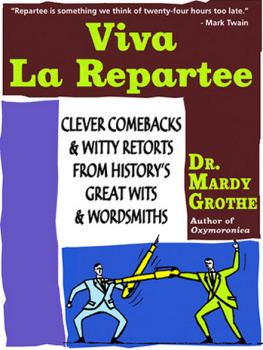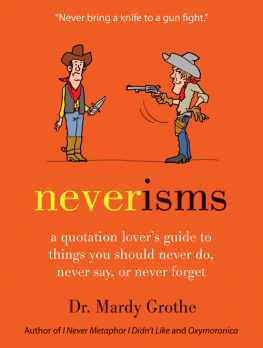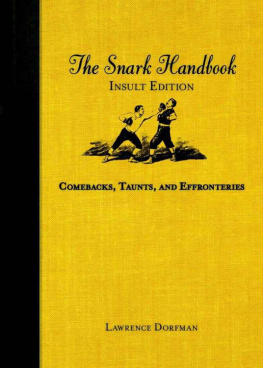Dr. Mardy Grothe - Viva la repartee: clever comebacks and witty retorts from historys great wits & wordsmiths
Here you can read online Dr. Mardy Grothe - Viva la repartee: clever comebacks and witty retorts from historys great wits & wordsmiths full text of the book (entire story) in english for free. Download pdf and epub, get meaning, cover and reviews about this ebook. year: 2009, publisher: HarperCollins e-books, genre: Detective and thriller. Description of the work, (preface) as well as reviews are available. Best literature library LitArk.com created for fans of good reading and offers a wide selection of genres:
Romance novel
Science fiction
Adventure
Detective
Science
History
Home and family
Prose
Art
Politics
Computer
Non-fiction
Religion
Business
Children
Humor
Choose a favorite category and find really read worthwhile books. Enjoy immersion in the world of imagination, feel the emotions of the characters or learn something new for yourself, make an fascinating discovery.
- Book:Viva la repartee: clever comebacks and witty retorts from historys great wits & wordsmiths
- Author:
- Publisher:HarperCollins e-books
- Genre:
- Year:2009
- Rating:3 / 5
- Favourites:Add to favourites
- Your mark:
- 60
- 1
- 2
- 3
- 4
- 5
Viva la repartee: clever comebacks and witty retorts from historys great wits & wordsmiths: summary, description and annotation
We offer to read an annotation, description, summary or preface (depends on what the author of the book "Viva la repartee: clever comebacks and witty retorts from historys great wits & wordsmiths" wrote himself). If you haven't found the necessary information about the book — write in the comments, we will try to find it.
Dr. Mardy Grothe: author's other books
Who wrote Viva la repartee: clever comebacks and witty retorts from historys great wits & wordsmiths? Find out the surname, the name of the author of the book and a list of all author's works by series.
Viva la repartee: clever comebacks and witty retorts from historys great wits & wordsmiths — read online for free the complete book (whole text) full work
Below is the text of the book, divided by pages. System saving the place of the last page read, allows you to conveniently read the book "Viva la repartee: clever comebacks and witty retorts from historys great wits & wordsmiths" online for free, without having to search again every time where you left off. Put a bookmark, and you can go to the page where you finished reading at any time.
Font size:
Interval:
Bookmark:
Clever Comebacks and Witty Retorts
from Historys Great Wits & Wordsmiths

TO RUTH BELT ROBINSON,
tireless advocate and inspiring role model
Chapter Two: Classic Quips, Ad-libs,
& Off-the-Cuff Remarks
S ince the beginning of civilization, people have been regaling one another with tales of clever comebacks and witty replies. The storiesalmost always told with a tone of admirationpay homage to great wit, especially when that wit is exhibited under pressure. Two classic yarns feature Winston Churchill.
The first involves Nancy Astor, an American socialite who married into an English branch of the wealthy Astor family (she holds the distinction of being the first woman elected to Parliament). At a 1912 dinner party in Blenheim Palacethe Churchill family estateLady Astor became annoyed at an inebriated Churchill, who was pontificating on some topic. Unable to take any more, she finally blurted out, Winston, if you were my husband, Id put poison in your coffee. Without missing a beat, Churchill replied:
Nancy, if you were my wife, Id drink it.
The second story also involves a London party and a female member of Parliament (M.P.), and once again a slightly inebriated Churchill. This time, it was Bessie Braddock, a socialist M.P. from Liverpool, who finally had enough. She reproached Churchill by charging, Winston, youre drunk! The Grand Old Man may have had one too many drinks, but he still had his wits about him, replying:
Youre right, Bessie. And youre ugly.
But tomorrow morning, Ill be sober.
Most people couldnt come up with better comebacks if they had a month to think about it. But Churchill was able to compose and deliver his words almost instantaneously. A truly great reply that defeatsor deflatesan opponent is called a retort, which the Oxford English Dictionary ( OED ) defines this way:
A sharp or incisive reply, especially one by which the first speakers statement or argument is in some way turned against himself.
The word retort , which first appears in English in 1557, derives from the Latin word retortus , meaning to turn back. And this, of course, is exactly what a perfectly executed retort does: it turns back a personal attack, transforming a momentary threat into a personal triumph.
Retorts do not occur in a vacuum, but in social interaction, and usually in response to some kind of critical remark. In a pressure-filled situation like this, some exceptional individuals are able to remain calm. But even more important, theyre somehow able to use their wit and their verbal skills to formulate a reply that turns the tables on the aggressor. When most of us regular people are thrust into a similar situation, we dont perform nearly so well. Many of us crumble, or become tongue-tied. Or we just blurt out some expletive or other unsatisfying remark. Yes, we may eventually come up with a great reply, but it usually comes to our mind far too late, well after it was needed. The all-too-common phenomenon is captured by a wonderful French expression: lesprit de lescalier (the wit of the staircase).
The concept of staircase wit , authored by the French writer Denis Diderot, refers to those devastatingly clever remarks that were unable to produce when theyre needed, but come to mind with perfect clarity moments later, as were walking down the staircase and heading out the door. There is no similar expression in English, but the Germans have long had their own word for it: Treppenwitz (also staircase wit). The writer Heywood Broun certainly had this phenomenon in mind when he wrote: Repartee is what you wish youd said.
While most of historys great retorts are spread by admiring fans, some are told by the authors themselves, eager to share their moments of brilliance. Truman Capote was fond of regaling people with an anecdote about one of his finer moments. At the height of his popularity, he was drinking one evening with friends in a crowded Key West bar. Nearby sat a couple, both inebriated. The woman recognized Capote, walked over to his table, and gushingly asked him to autograph a paper napkin. The womans husband, angry at his wifes display of interest in another man, staggered over to Capotes table and assumed an intimidating position directly in front of the diminutive writer. He then proceeded to unzip his trousers and, in Capotes own words, hauled out his equipment. As he did this, he bellowed in a drunken slur, Since youre autographing things, why dont you autograph this? It was a tense moment, and a hush fell over the room. The silence was a blessing, for it allowed all those within earshot to hear Capotes soft, high-pitched voice deliver the perfect emasculating reply:
I dont know if I can autograph it,
but perhaps I can initial it.
A retort is a verbal counterpunch against someone whos taken the first shot. No matter how knee-buckling the first blow, an exceptional retort can turn a match around, and even knock out an opponent. Perhaps the classic example in the history of wit is the story of a famous exchange between two eighteenth-century political rivals, John Montagu, also known as the Fourth Earl of Sandwich, and the reformist politician, John Wilkes. During a heated argument, Montagu scowled at Wilkes and said derisively, Upon my soul, Wilkes, I dont know whether youll die upon the gallows, or of syphilis (some versions of the story say a vile disease and others the pox). Unfazed, Wilkes came back with what many people regard as the greatest retort of all time:
That will depend, my Lord, on whether
I embrace your principles, or your mistress.
Its almost impossible to think about the word retort without thinking of another word weve borrowed from the French: repartee . The OED defines it this way:
- A ready, witty, or smart reply; a quick and clever retort.
- Sharpness or wit in sudden reply; such replies collectively; the practice or faculty of uttering them.
Repartee derives from a seventeenth-century French word repartie , meaning an answering blow or thrust. Originally a fencing term, repartie itself comes from another French word meaning to reply promptly. By the 1700s, when the word began to become popular in English, the preferred pronunciation was reh-par-TEE, but over the years more and more English speakers began to say reh-par-TAY (probably influenced by other French borrowings like fiance and negligee ). While both pronunciations are considered acceptable, I prefer the TAY version.
The word repartee often conjures up an interaction marked by the quick exchange of sharp and witty remarks. And when it comes to repartee, nobody did it better than the members of that legendary collection of wits known as the Algonquin Round Table (more on them in a later chapter). For many decades, a delightful story has been told about one member of the group, playwright Marc Connelly. One evening, Connelly was dining with friends when another member of the group snuck up from behind, placed his hands on top of Connellys bald head, and said to the amusement of the other guests, Marc, your head feels as smooth as my wifes ass. Connelly instantly raised his hands to his head, began rubbing his own scalp, and with a wry smile, said:
So it does, so it does.
While the word retort suggests the notion of putting adversaries and opponents in their place, repartee is a broader term that refers to clever or witty remarks in almost any social situation. Repartee stories have been around for centuries.
In the first century A . D ., the Greek writer Plutarch wrote Parallel Lives, a book recounting the heroic deeds and exemplary characters of major figures in Greek and Roman history. While most of the stories celebrated the exploits of ancient heroes, Plutarch also provided revealing little anecdotes about their private lives. One charming story involved a Greek nobleman named Antigonus. Informed by a messenger that his adult son Demetrius was ill, Antigonus decided to pay him a visit. Arriving at the front door of his sons house, the concerned father ran head-on into a beautiful young woman, who brushed quickly by as she was leaving. Slightly puzzled, Antigonus went straight to the bedroom and began ministering to his son. As he placed his hand on his sons forehead, he asked, How are you feeling? The son looked up weakly and said in a soft voice, The fever has just left me, I think. Antigonus replied knowingly:
Font size:
Interval:
Bookmark:
Similar books «Viva la repartee: clever comebacks and witty retorts from historys great wits & wordsmiths»
Look at similar books to Viva la repartee: clever comebacks and witty retorts from historys great wits & wordsmiths. We have selected literature similar in name and meaning in the hope of providing readers with more options to find new, interesting, not yet read works.
Discussion, reviews of the book Viva la repartee: clever comebacks and witty retorts from historys great wits & wordsmiths and just readers' own opinions. Leave your comments, write what you think about the work, its meaning or the main characters. Specify what exactly you liked and what you didn't like, and why you think so.











